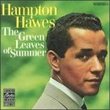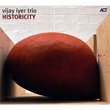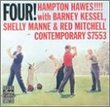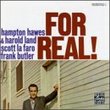| All Artists: Hampton Hawes Title: Vol. 1-Hampton Hawes Trio (20 Bit Mastering) Members Wishing: 2 Total Copies: 0 Label: Contemporary Release Date: 8/15/2000 Album Type: Original recording remastered Genres: Jazz, Pop Style: Bebop Number of Discs: 1 SwapaCD Credits: 1 UPC: 025218481120 |
Search - Hampton Hawes :: Vol. 1-Hampton Hawes Trio (20 Bit Mastering)
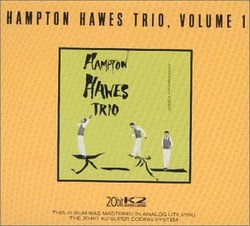 | Hampton Hawes Vol. 1-Hampton Hawes Trio (20 Bit Mastering) Genres: Jazz, Pop
Japanese limited edition issue of the album classic in a deluxe, miniaturized LP sleeve replica of the original vinyl album artwork. |
Larger Image |
CD DetailsSynopsis
Album Description Japanese limited edition issue of the album classic in a deluxe, miniaturized LP sleeve replica of the original vinyl album artwork. Similar CDs
|
CD ReviewsOn fire... Your Pet Poodle | Twin Cities, MN | 11/25/2004 (5 out of 5 stars) "Ironically, the Hawes Trio, Vol. 1 was probably Hamp's finest hour. I can only speculate that ongoing problems with addiction contributed to his less lucid subsequent offerings. Nevertheless, this tour de force rivals any 'bop record EVER. From the blistering bridge on the head of "I Got Rhythm", it is as plain as day that Hawes won't be taking prisoners. His extremely lyrical linear invention and pugilistic articulation forces the listener to pay attention. Long, perfectly executed doubled-up lines on tunes like "Blues the Most", are melodic models for players almost 50 years later. The hard-edged relentless swing of "What is This Thing Called Love" defines the term "pocket." While Hawes didn't possess Peterson-esque technique (few did), he was completely comfortable with other devices such as block chords and rhapsodic ballad renderings. In fairness, while Oscar could cut nearly everyone in the chops dept., he was NOT a bebop player. Yes, there were Bud, Tommy Flanagan, Red Garland, Wynton, Horace, Sonny Clark, and a host of others. All favorites, all splendid. But on this record, Hamp had the floor. And it's indeed fortunate that the studio withstood the heat. Burnin'." Hampton Hawes Trio Vol 1 Matthew Watters | 07/23/2002 (3 out of 5 stars) "No offense to diehard fans of the late Mr. Hawes, but I am inclined to agree to with the previous reviewer who wanted to give the album 3 stars and didn't. To this listener's ears, the playing on this record leaves Hawes in an artistic no mans land--not virtuosic enough to keep up with Peterson or Newborn and not subtle enough to compare with Sonny Clark, Tommy Flanagan or Hank Jones. From the opening cut on I Got Rhythm there is a hard driving style that sets the tone for the record: lots of phrases and little space eventually leading to monotony. There is not enough interest and thought to the solo lines to sustain a close listening. As opposed to similar artist Peterson,who played ballads with sparkle, sobriety and taste, Hawes ballad efforts (These Foolish Things)also fall short because there is not enough harmonic ingenuity, voice leading and touch to be moving. Hawes is not helped with the piano quality on this either. He has better recordings later especially as a sideman but on this one he's just not thinking enough. The consecutive blues tunes in the same key probably don't help the freshness either. This was probably a "let the tape roll" kind of session but the artist has to live with the results, inspired or uninspired. To my ears this was the latter." Great Jazz Trio J. Rich | 12/12/2008 (5 out of 5 stars) "Hampton Hawes is one of my favorite bebop pianists. He can swing with the best of them: Oscar Peterson, Bud Powell, Thelonious Monk, Bill Evans, etc., but ultimately, Hawes' place in the jazz history books is overshadowed by these great players as is Elmo Hope's, another great player in the Bud Powell tradition that paved his own way. "Trio, Vol. 1" features Red Mitchell on bass and Chuck Thompson on bass. This trio swings hard and if you liked any of the jazz pianists I mentioned, then you should definitely check out Hawes' music, especially all volumes of this series."
|

 Track Listings (10) - Disc #1
Track Listings (10) - Disc #1